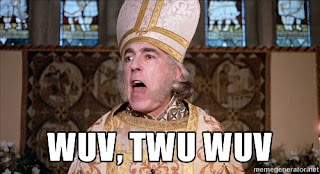Weird, right? I've been acting in Shakespeare plays for over a decade and I've never taken whatever nascent thoughts I had about Juliet very much deeper than, "I wouldn't play her like that; that's boring. She's so passive there."
Part of that can probably be explained by combined forces of casting and preference that drive me more towards the traditional breeches roles and the clowns. The closest I've been to Juliet before now was in the balcony scene, but as her counterpart. I didn't understand Juliet at all and didn't particularly try. Working on What, Lamb! What, Ladybird! has tapped some vein that was running real deep for a long time, and, to my own surprise, apparently I do have things to say about Juliet! I'm going to try to distill them down into six words.
Ready?
Okay, go.
 |
| The band OK GO |
Love is a choice that Juliet makes. And makes. And makes again.
Okay, that was eleven words, but the first sentence was six and that's what counts.
Let me explain.
 My thoughts about Juliet are impossibly entwined with my thoughts about love. What does it mean to love? What is "true love"? Is the love Romeo and Juliet have really a healthy model of romantic love? There are many more answers to these questions than there is space in this blog post, which is lucky because I don't care about those questions here. I'm not particularly interested in the love between Romeo and Juliet here. When I say love is a choice that Juliet makes, I mean she makes the choice to love herself. Sarah (via Charlene) has a fantastic line towards the end of the play: "[Juliet] trusts...She trusts her own heart."
My thoughts about Juliet are impossibly entwined with my thoughts about love. What does it mean to love? What is "true love"? Is the love Romeo and Juliet have really a healthy model of romantic love? There are many more answers to these questions than there is space in this blog post, which is lucky because I don't care about those questions here. I'm not particularly interested in the love between Romeo and Juliet here. When I say love is a choice that Juliet makes, I mean she makes the choice to love herself. Sarah (via Charlene) has a fantastic line towards the end of the play: "[Juliet] trusts...She trusts her own heart."I can't be the only one to find this a huge deal for a young teenager. That is prime self-doubt time. I was certainly not that self-assured at thirteen. So let's break this down into the three times I think Juliet makes the choice to love and trust herself (and why I love her for it).
Choice 1: Romeo
 |
| No, not this Romeo |
Romeo is what Juliet had no idea she wanted until he opened his dang smooth-talking mouth. Not because of the smooth-talking, because she probably has actually heard some similar attempts before, being the eligible bachelorette she is. She's never had an equal partner before. She's never been able to spar verbally like this before. She's always been sharper than everyone else in the room. (She still kind of is, but Romeo can at least keep up.) Juliet realizes almost immediately that she wants THIS GUY for her partner and says damn the torpedoes to any and all obstacles. She trusts her choice.
This is not to say that she becomes so single-minded in pursuit of her life with Romeo that everything else in her life loses meaning. Her suffering at Tybalt's death and her parents' machinations is very real, but she doesn't let these overwhelm her focus, which leads me to...
Choice 2: A thing like death
 |
| One more Princess Bride meme than you were expecting, right? It's okay, just roll with it. |
To Juliet, marrying Paris and realigning with her nuclear family, forsaking her new family of choice, would be the real death. That would be death and burial of her true self, and whatever lived on with Paris wouldn't be Juliet. So when she's faced with this non-choice, marrying Paris and subsuming herself or retaining herself and subjecting her physical body to starvation on the streets, what does she do? She finds door number three! She creates agency where none is freely available. She goes to the Friar and blackmails him into helping her escape with Romeo. And there's always the chance that something could go wrong here. Cue...
Choice 3: Happy dagger
When the plan falls through, which of course it does, Juliet again has a choice. She can live the rest of her life under someone else's terms by letting herself be found and returned to the Capulets. Or she can live the rest of her life under her own terms by ending it. Having just lost the only thing she was willing to take decisive action to obtain, the person who represented the freedom and the life she was building for herself, she trusts herself again and ends her life on her terms.
But wait, you're thinking, none of these choices seem particularly well-considered. I'm not sure I could fall in love with someone so quickly, or if that would even be love or just infatuation. If they survived long enough to actually live together as a married couple the shine would have gone off of that within a month.
You're right. And that's the whole point. In What, Lamb! What, Ladybird! we mention that the entire action of Romeo and Juliet takes place over just a few days. There's no time for the shine to come off or for anybody to make any considered decisions. These are reactions, not calculations. And that is fascinating to play. Juliet's objectives and through line are amazingly clear, and that makes her actions immediately understandable and relatable, no matter how far from what we would have done they may be.
No comments:
Post a Comment